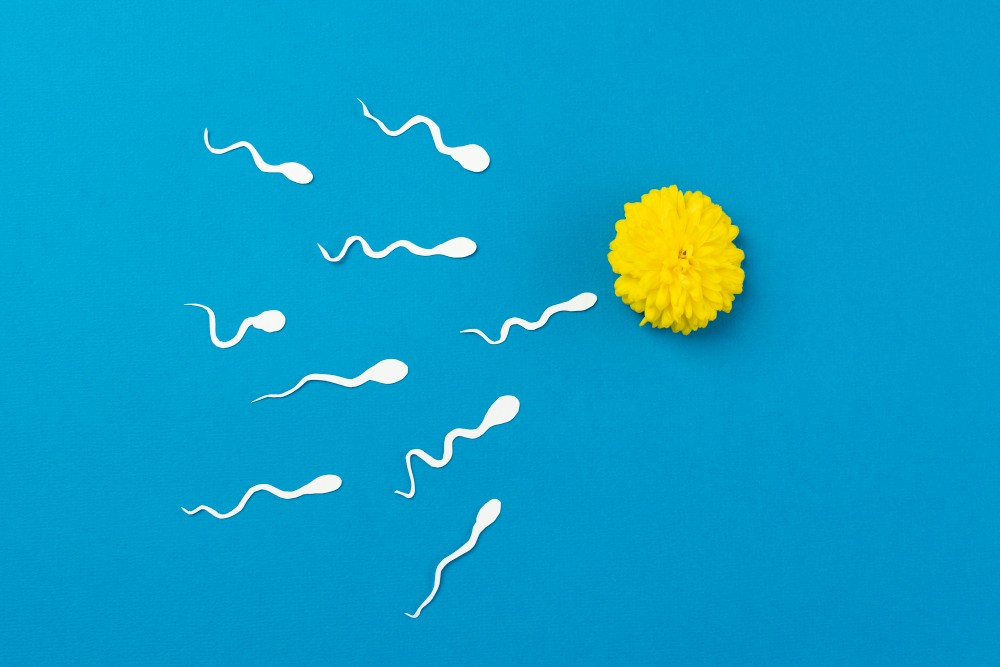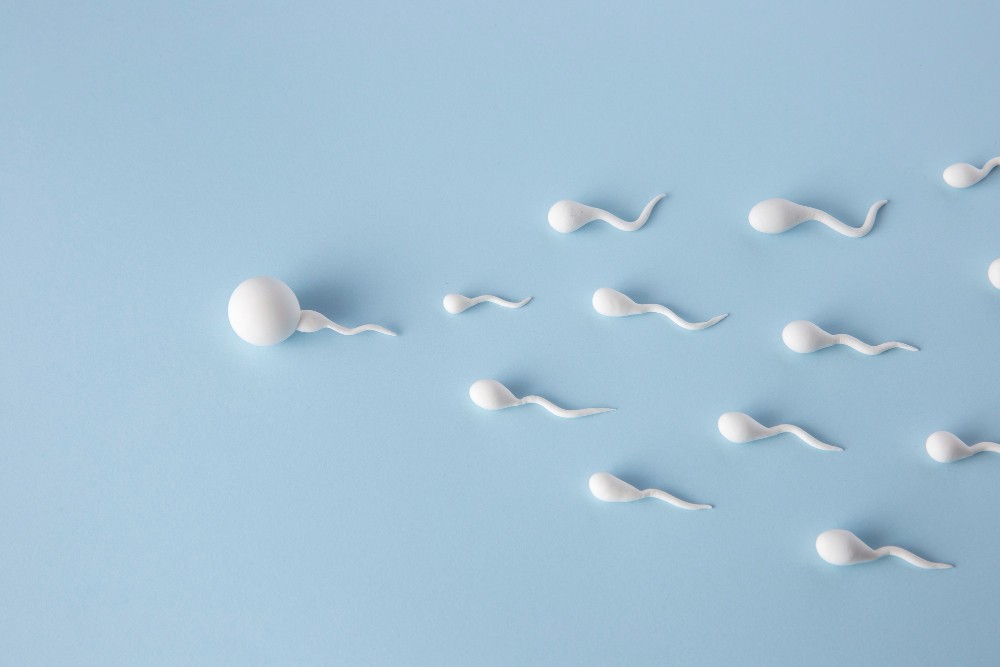Kualitas dan kuantitas sperma merupakan faktor penting yang menentukan keberhasilan program hamil Anda. Sayangnya, terkadang banyak pria yang tidak menyadari bahwa dirinya mengalami oligospermia, yaitu jumlah sperma yang dikeluarkan saat berhubungan seksual kurang dari batas normal. Seperti apa oligospermia dan bagaimana penanganannya? Simak dalam artikel berikut.
Apa Itu Oligospermia?
Salah satu masalah kesuburan yang jarang disadari adalah oligospermia, yaitu sedikitnya jumlah sperma yang dikeluarkan saat mengalami orgasme. Banyak orang tidak mengetahui dirinya mengalami oligospermia hingga mereka menjalani program hamil.
Seseorang diikatakan mengalami oligospermia ketika jumlah sperma yang dikeluarkan kurang dari 15 juta sel dalam 1 ml air mani. Apabila tidak ada satu pun sperma yang dikeluarkan saat orgasme, kondisi ini dikenal dengan istilah azoospermia.
Baca Juga: Berapa Lama Sperma Bertahan di Luar Setelah Ejakulasi?
Gejala Oligospermia
Oligospermia tidak menunjukkan gejala yang tampak atau mudah diamati. Gejala utama seseorang diduga mengalami oligospermia adalah sulit untuk terjadi kehamilan. Tidak ada gejala yang jelas mengenai oligospermia. Pria yang mengidap oligospermia kemungkinan mengalami beberapa gejala lain seperti berikut:
- Memiliki masalah fungsi seksual seperti memiliki dorongan seks rendah, atau disfungsi ereksi.
- Nyeri atau pembengkakan di area testis.
- Berkurangnya rambut wajah atau tubuh atau gejala lain dari kelainan kromosom atau hormon.
Bila Anda dan pasangan telah melakukan hubungan seksual secara teratur tanpa menggunakan alat kontrasepsi selama lebih dari 1 tahun dan belum hamil, sebaiknya periksakan ke dokter untuk mengetahui kemungkinan permasalahan reproduksi yang dialami.
Penyebab Oligospermia
Penyebab rendahnya produksi sperma dapat dipengaruhi beberapa faktor, seperti faktor medis dan lingkungan. Agar menghasilkan sperma, testis dan organ tertentu di otak yang menghasilkan hormon harus bekerja dengan optimal. Setelah sperma menghasilkan testis, sperma bergerak dalam saluran untuk bercampur dengan air mani. Ketika orgasme, air mani yang telah bercampur sperma kemudian dilepaskan.
Rendahnya jumlah sperma dapat dipengaruhi oleh berbagai faktor, di antaranya:
- Varikokel. Varikokel adalah pembesaran pembuluh darah vena di dalam kantung yang berfungsi menahan testis (skrotum). Kondisi ini disebabkan oleh kerusakan fungsi katup pembuluh darah kantung skrotum sehingga pembuluh darah bengkak. Belum diketahui bagaimana varikokel menyebabkan jumlah sperma menurun, namun diduga kondisi ini memengaruhi suhu di testis.
- Infeksi. Infeksi dari virus, bakteri, atau jamur yang menyebabkan pembengkakan pada testis atau epididimis bisa memengaruhi kemampuan tubuh dalam menghasilkan sperma. Begitu juga infeksi menular seksual seperti gonore atau HIV juga dapat memengaruhi jumlah sperma dan kesuburan.
- Penggunaan obat-obatan tertentu. Konsumsi obat-obatan tekanan darah diketahui dapat memengaruhi produksi sperma.
- Tumor. Terbentuknya tumor jinak maupun ganas (kanker) dapat memengaruhi organ reproduksi pria secara langsung atau memengaruhi produksi hormon yang memengaruhi kuantitas sperma yang dihasilkan.
Selain penyebab di atas, beberapa penyebab lainnya yang dapat memengaruhi jumlah sperma di antaranya
- Testis yang tidak turun (kriptorkismus)
- Ketdakseimbangan hormon
- Gangguan saluran yang membawa sperma
- Faktor genetik
- Memiliki riwayat operasi sebelumnya
- Paparan bahan kimia dan logam berat
- Paparan radiasi
- Kebiasaan merokok
- Stres
- Obesitas
Baca Juga: Ciri-Ciri Sperma yang Sehat
Penanganan Oligospermia
Apabila hasil pemeriksaan air mani menunjukkan bahwa jumlah sperma sehat di bawah normal, dokter dapat merekomendasikan penanganan sesuai dengan penyebabnya. Beberapa penanganan oligospermia mencakup di antaranya:
- Operasi. Oligopsermia akibat varikokel atau tersumbatnya saluran sperma vas deferens sering kali dapat diatasi dengan pembedahan.
- Pemberian antibiotik untuk mengatasi infeksi. Namun, penanganan infeksi tidak selalu mengembalikan kesuburan.
- Perawatan untuk kondisi seksual baik dengan obat-obatan atau konseling.
- Perawatan dan pengobatan hormon.
Oligospermia atau sedikitnya jumlah sperma yang dihasilkan sering kali baru diketahui setelah menjalani progam hamil. Umumnya, kasus oligospermia dapat diatasi sehingga program hamil yang Anda jalani akan berhasil.
Jika Anda mengalami tanda-tanda oligospermia sebaiknya segera periksakan ke dokter. Anda juga bisa memanfaatkan fitur konsultasi pada aplikasi Ai Care yang bisa diunduh melalui aplikasi App Store atau Play Store.
Mau tahu informasi seputar penyakit lainya? Cek di sini, yah!
- dr Nadia Opmalina
Mayo Clinic. Low Sperm Count. Available from: https://www.mayoclinic.org/diseases-conditions/low-sperm-count/symptoms-causes/syc-20374585
NHS. Low Sperm Count. Available from: https://www.nhs.uk/conditions/low-sperm-count/
Cleveland Clinic. (2022). Oligospermia (Low Sperm Count). Available from: https://my.clevelandclinic.org/health/diseases/22477-oligospermia-low-sperm-count
Huizen, J. (2023). What are the best ways to increase sperm count?. Available from: https://www.medicalnewstoday.com/articles/320010
Marcin, A. (2020). What Causes Low Sperm Count and How Is It Treated?. Available from: https://www.healthline.com/health/infertility/low-sperm-count












